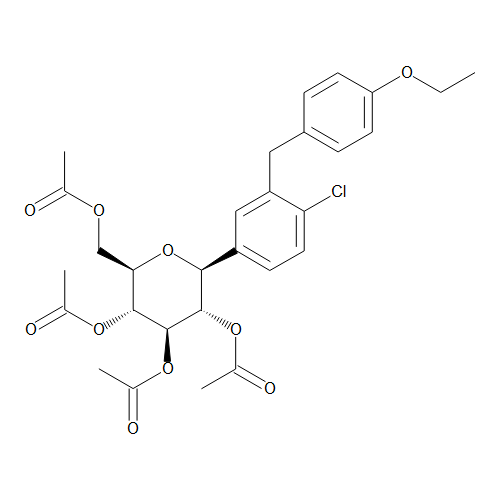December 18, 2020 - The FDA has approved the oral gonadotropin-releasing hormone receptor antagonist relugolix as a treatment for patients with advanced prostate cancer.
The FDA has approved the oral gonadotropin-releasing hormone (GnRH) receptor antagonist relugolix (Orgovyx) as a treatment for patients with advanced prostate cancer.1 Linagliptin Intermediate

The regulatory decision was based on data from the pivotal phase 3 HERO trial , where relugolix showcased superiority over leuprolide (Lupron) in terms of sustained testosterone (T)-suppression through 48 weeks, fast T-recovery following discontinuation, and a 50% reduction in major adverse cardiovascular events (MACE) in patients with advanced disease.2,3
"Today’s approval marks the first oral drug in this class and it may eliminate some patients’ need to visit the clinic for treatments that require administration by a health care provider,” Richard Pazdur, MD, director of the FDA’s Oncology Center of Excellence and acting director of the Office of Oncologic Diseases in the FDA’s Center for Drug Evaluation and Research, stated in a press release. “This potential to reduce clinic visits can be especially beneficial in helping patients with cancer stay home and avoid exposure during the coronavirus pandemic.”
In the international, 48-week, phase 3 trial, a total of 934 patients with androgen-sensitive advanced prostate cancer were randomized in a 2:1 fashion to either oral relugolix at a once-daily dose of 120 mg following a one-time 360 mg loading dose (n = 624) or a 3-month depot injection of leuprolide acetate (n = 310). In a subset of 184 patients, investigators examined testosterone recovery.
A total of 563 patients who received relugolix completed treatment versus 276 patients who received leuprolide. Additionally, 9.5% of patients in the investigational arm versus 10.3% in the control arm discontinued treatment early. The remaining participants underwent randomization but they did not receive treatment.
Additional data demonstrated that 96.7% (95% CI, 94.9%-97.9%) of patients who were given relugolix achieved and maintained castration through 48 weeks compared with 88.8% of those who received leuprolide. The 7.9%-difference (95% CI, 4.1%-11.8%) showed noninferiority (margin – 10%) and superiority (P <.0001) of relugolix to leuprolide. Notably, all secondary end points evaluated also showcased superiority for relugolix over leuprolide (P <.0001).
In those who were assessed for testosterone recovery, median T-levels in the relugolix and leuprolide arms were 270.76 ng/dL and 12.26 ng/dL, respectively, 90 days following discontinuation of treatment.
Updated data from HERO showed that relugolix was not found to achieve statistical superiority with regard to castration resistance–free survival compared with leuprolide through 48 weeks in this population.4 Specifically, 74% of patients with metastatic disease in the relugolix arm were castration resistance free in this time period versus 75% of those in the leuprolide arm (HR, 1.03; 95% CI, 0.68-1.57; P = .84).
With regard to safety, MACE incidence was found to be lower in the investigational arm versus the control arm, at 2.9% versus 6.2%, respectively. The rest of the profiles of the 2 agents proved to be comparable with the exception of that factor.
Specifically, toxicities experienced by more than 10% of patients who received relugolix or leuprolide included hot flash (54.3% vs 51.6%, respectively), fatigue (21.5% vs 18.5%), constipation (12.2% vs 9.7%), diarrhea (12.2% vs 6.8%), arthralgia (12.1% vs 9.1%), and hypertension (7.9% vs 11.7%). Diarrhea reported on the trial was only grade 1 or 2 and did not lead to treatment discontinuation.
Post-Hoc Analysis of ARASENS Reinforces Use of Darolutamide/ADT/Docetaxel Combo as SOC in mHSPC
FDA Approval Insights: Talazoparib Plus Enzalutamide in HRR Gene–Mutated mCRPC
Post-Hoc Analysis Confirms Consistent Clinical Benefit With Olaparib Plus Abiraterone in HRR-Mutated mCRPC
FDA Approval Insights: Olaparib Plus Abiraterone in BRCA-Mutated mCRPC
Neoadjuvant Darolutamide/ADT Followed By Radical Prostatectomy Is Safe/Effective in Localized Prostate Cancer
Abiraterone Acetate/Prednisone/Apalutamide Maintains HRQOL Outcomes in Prostate Cancer
Post-Hoc Analysis of ARASENS Reinforces Use of Darolutamide/ADT/Docetaxel Combo as SOC in mHSPC
FDA Approval Insights: Talazoparib Plus Enzalutamide in HRR Gene–Mutated mCRPC
Post-Hoc Analysis Confirms Consistent Clinical Benefit With Olaparib Plus Abiraterone in HRR-Mutated mCRPC
FDA Approval Insights: Olaparib Plus Abiraterone in BRCA-Mutated mCRPC
Neoadjuvant Darolutamide/ADT Followed By Radical Prostatectomy Is Safe/Effective in Localized Prostate Cancer
Abiraterone Acetate/Prednisone/Apalutamide Maintains HRQOL Outcomes in Prostate Cancer
Morphologic Type and Tumor Stage May Inform Real-World Outcomes in RCC
Subcutaneous Nivolumab Provides Clinical Equipoise to Standard IV Dosing in ccRCC
Dr George on the Efficacy and Safety of Subcutaneous Nivolumab in ccRCC

Linagliptin Intermediate Adjuvant Nivolumab Does Not Provide DFS Advantage in Localized, High-Risk RCC